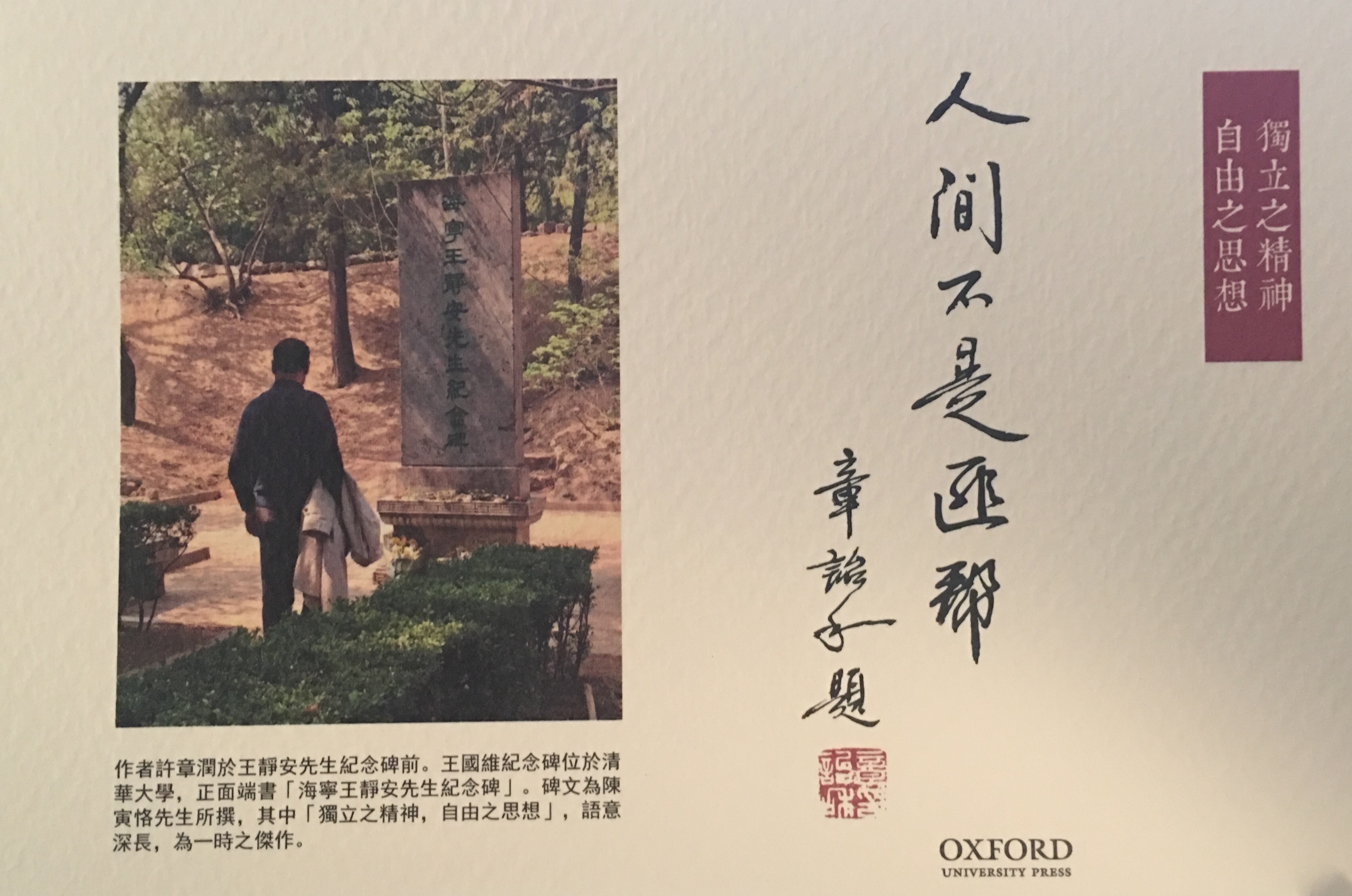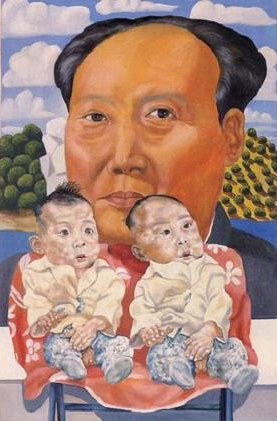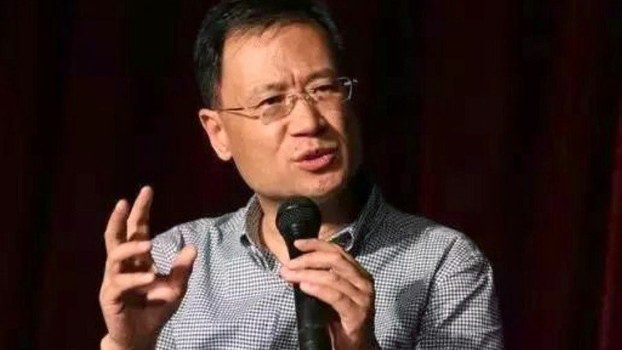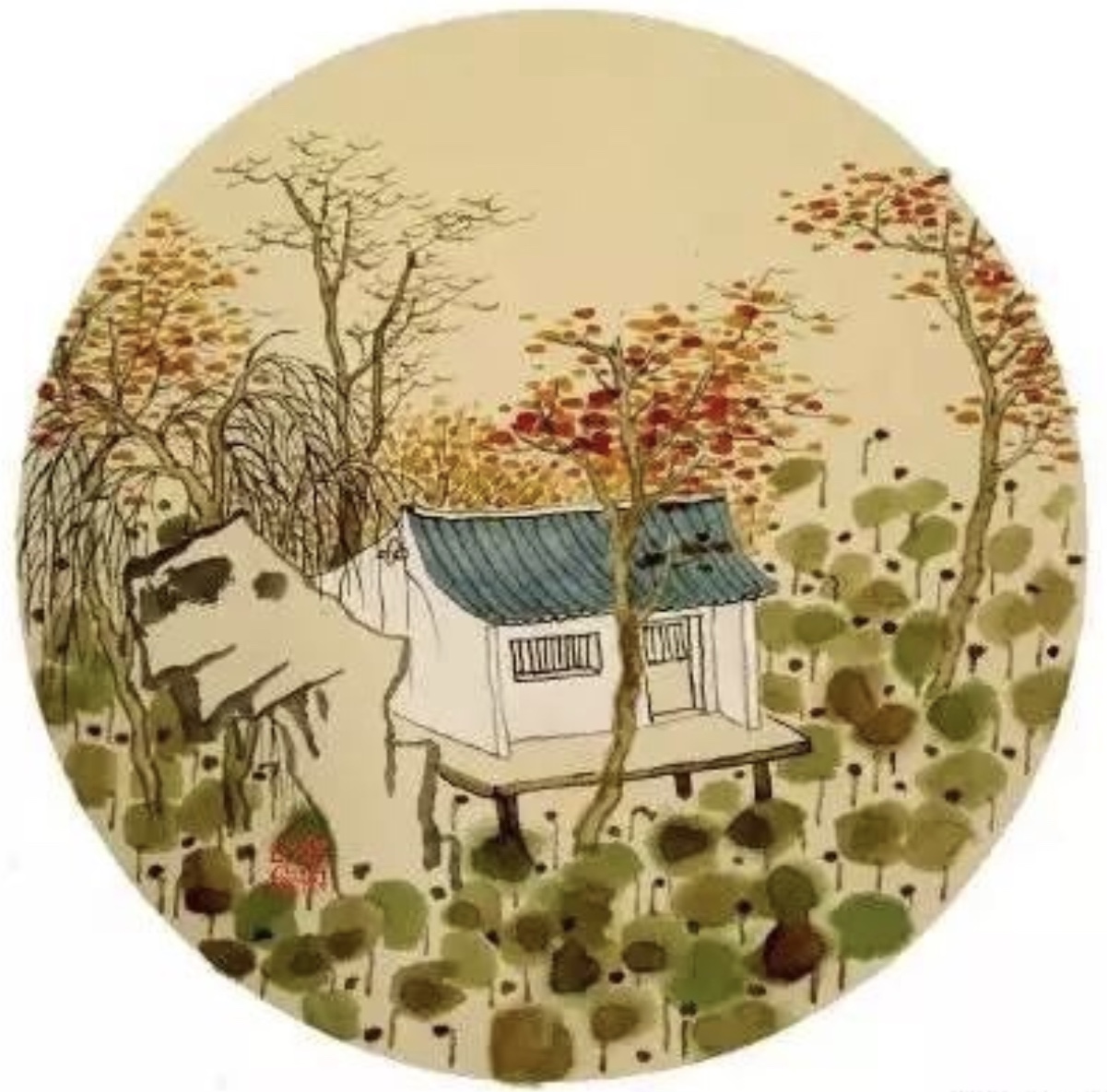Xu Zhangrun vs. Tsinghua University
Voices of Protest & Resistance (XXIX)
人心不堪重負,人性不甘受困於牢籠,時時欲放縱,處處要掙脫。
— Xu Zhangrun 許章潤

In late June 2019, as Hong Kong was rocked by demonstrators protesting en masse against an Extradition Bill proposed by Carrie Lam (Lam Cheng Yuet-ngor 林鄭月娥, 1957-), the city’s Beijing-anointed chief executive, Professor Xu Zhangrun of Tsinghua University in Beijing published two books in the territory that, as chance would have it, highlighted the widespread concerns being expressed on the streets of the former British colony.
Making a Case for Humanity Over Banditry 《人間不是匪幫》, published by Oxford University Press, is a selection of commentaries, essays, reviews and memoirs written by Xu Zhangrun between September 2012 and February 2019. Many of the chapters have previously appeared online, while some were composed following the publication of the author’s controversial July 2018 essay ‘Imminent Fears, Immediate Hopes’ 我們當下的恐懼與期待 (China Heritage, 1 August 2018). Although the ninety essays contained in Xu’s new book range over many topics, they reflect an abiding theme in the author’s thinking: humanity and decency, as opposed to the hypocrisy and lawlessness of one-party autocracy.
Below, we first pause to introduce the Introduction of Professor Xu’s book by offering an essay from the collection itself. ‘A Life at the Lectern’ 一輩子站講台 originally appeared in March 2016 and, unbeknownst to its author at the time, it would be something of an envoi to his previous life since, due to his increasingly outspoken criticisms of the Chinese Communist Party dating from that year, he would eventually be banned from his beloved career as a university lecturer. From late 2018, he was cautioned against all forms of public engagement and, from March 2019 further explicitly banned by ‘special investigators’ assigned to his ‘case’ at Tsinghua University from publishing, be it on Mainland China, in Hong Kong, Taiwan or elsewhere. His response to such interdictions has been that of unswerving recalcitrance and although Xu’s fate alerted people both in- and outside China to the increasingly blighted intellectual landscape of the People’s Republic, his work as well as the voices of his supporters have been a warning and a clarion call to all those who oppose and who are willing to resist Communist Party dominion.
***
‘A Life at the Lectern’ is the second chapter in Making a Case for Humanity Over Banditry. Two other chapters from the collection have previously appeared in translation in China Heritage:
- And Teachers, Then? They Just Do Their Thing! 哪有先生不說話?!, China Heritage, 10 November 2018: and,
- To Summon a Wandering Soul 私塾先生, China Heritage, 28 November 2018
The Chinese title of the collection — 《人間不是匪幫》 rénjiān bù shì fěibāng — contrasts the words ‘humanity’ 人間 rénjiān and ‘bandits’, or ‘gangsters’, 匪幫 fěibāng (which is also the Chinese translation of ‘Gangsta’ as in ‘Gangsta Rap’ 匪幫說唱). Both here and in his other writings and speeches, Xu Zhangrun posits that the realm of human decency is in principled opposition to that of ‘banditry” or ‘bastardry’ — the gamut of behaviours germane to the lawless and the illegitimate.
人間 rénjiān, literally, ‘among human kind’, is an ancient expression used variously to indicate the concepts of ‘society’ and ‘popular’, as well as the Buddhist idea of the sphere of human incarnation. Here it means ‘the human condition’. The expression 匪幫 fěibāng — a gang of thugs, brigands, crooks, bandits, gangsters, mobsters, desperados — has profound traditional resonances as well as being significant in China’s modern history. Indeed, 匪幫 fěibāng evokes images of some of the most undesirable aspects of that country’s social and political life. 匪 fěi means bandit, outlaw or brigand; it is a word that comes to mind when discussing the outlaws — celebrated as desperado heroes — of The Outlaws of the Marsh (also known as The Water Margin 水滸傳), a famous late-fourteenth century novel. Those fictional rebels frequently featured in twentieth-century Chinese politics, in particular during the Cultural Revolution era (c.1964-1978). As ‘toughs’, ‘good fellows’ or ‘sterling-quality thugs’, or 好漢 hǎo hàn, they exemplified raffish rebelliousness, violence and even the concept of ‘honour among thieves’ 義氣 yìqì (for more on 好漢 hǎo hàn, see W.J.F. Jenner, ‘Tough Guys, Mateship and Honour: Another Chinese Tradition’, East Asian History, 1996, Issue 12 [December 1996]: 1-34).
Throughout much of the twentieth century, 匪 fěi — brigandry and bastardry — featured prominently in the nation’s politics. The rural rebellions encouraged by factions of the Communist Party from the mid 1920s were decried by the urban-based authorities as being little more than ‘peasant uprisings’ and, right up until the late 1980s, the KMT-Nationalists spoke derisively about ‘Commie Bandit’s 共匪 gòng fěi, ‘Mao Bandits’ 毛匪 Máo fěi and ‘Red Bandits’ 赤匪 chì fěi. They were also steadfast in their pursuit of ‘bandit suppression’ 剿匪 jiǎo fěi, even after they retreated to the island of Taiwan. For their part, the Communists mocked their establishment enemies as nothing more than 蔣匪 Jiǎng fěi — ‘Chiang [Kai-shek] Bandits’ — or ‘White Bandits’ 白匪 bái fěi, a term used in diachronic contradistinction to their proudly bloody hue; it was also analogous to the anti-Bolshevik ‘White Army’ of the Russian revolution. Over the years, 匪 fěi was used in conjunction with such terms as ‘riff-raff’ 痞子pǐzi and even ‘hooligan’ 流氓 liúmáng.

From the earliest days of his revolutionary careers, Mao Zedong appreciated the importance of banditry and rural uprisings; the observations he recorded of the oppressed peasantry in his home province of Hunan in 1927 would eventually became a central feature of Mao Thought. Where others identified destructive menace, Mao found a ‘movement of riffraff’ 痞子運動 pǐzi yùndòng that could further the greater ends of revolution:
The right-wing of the Kuomintang says, “The peasant movement is a movement of the riffraff, of the lazy peasants.” … In short, all those whom the gentry had despised, those whom they had trodden into the dirt, people with no place in society, people with no right to speak, have now audaciously lifted up their heads. They have not only lifted up their heads but taken power into their hands. They are now running the township peasant associations (at the lowest level), which they have turned into something fierce and formidable. They have raised their rough, work-soiled hands and laid them on the gentry. … Those who used to rank lowest now rank above everybody else; and so this is called “turning things upside down”.
— Mao Zedong, Report on an Investigation of the
Peasant Movement In Hunan, March 1927
毛澤東《湖南农民运动考察报告》
From the early 1950s under the direction of Mao and his colleagues, the whole country was swept up in a calculated and murderous ‘riff-raff movement’. Society was repeatedly convulsed by political movements that ‘turned things upside down’ and, forty years after Mao’s investigations in Hunan, another ‘riff-raff movement’ was launched with chaotic intensity by the Red Guards in 1966-1969. The student-led Red Guards believed they would achieve the revolutionary romantic ideals of the Communist Party where others had failed; but they also replicated in their language and behaviour the fictional world of the Mount Liang rebels of The Outlaws of the Marsh. The Red Guards might have envisioned themselves as ‘Mini Mao’, play acting revolution with deadly earnestness, but not only did their language and behaviour readily recall those Ming-dynasty fictional upstarts, for their ignominious fate had also been foretold in the bloody denouement of the novel. But even unto death Mao celebrated the surly peasant rebellion and, in 1975, he launched a political purge based on his interpretation of The Outlaws of the Marsh.
***
As we noted above, in the title of his new book — Making a Case for Humanity Over Banditry 《人間不是匪幫》 — Xu Zhangrun pairs the word 匪 fěi with 幫 bāng, another derogatory term used to describe a clutch, group, clique or faction. 幫 bāng famously occurs in the political expression 四人幫 sìrénbāng, or ‘Gang of Four’. Originally an invention of Mao Zedong, ‘Gang of Four’ was intended to be a cautionary shorthand describing his four closest allies, a group centred on Jiang Qing 江青, his fourth wife. The Chairman warned the group against giving falling into clumsy (and strategically ill-fated) factionalism — nonetheless, he encouraged their political ambitions. Shortly after Mao’s death in September 1976, the expression ‘Gang of Four’ was used in anti-Cultural Revolution offical propaganda to denounce the four revolutionary stalwarts — Wang Hongwen, Zhang Chunqiao, Jiang Qing and Yao Wenyuan — who were arrested in October 1976 along with many of their supporters. The expression was subsequently employed to attack policies associated not only with the ‘Gang’ but, by association, with Mao himself.
In combining the words 匪 fěi and 幫 bāng — 匪幫 fěibāng — Xu Zhangrun suggests an illicit and lawless grouping that has nothing but mayhem, mischief and deviltry in mind. For this reader, it recalls an observation about the Chinese Communist Party made by Simon Leys in 1977:
The psychology and behaviour of Peking’s ruling clique are those of gangsters. This in not just a colourful and polemical way of speaking but a sober statement of fact, and in fact it is the underworld which might find the comparison insulting — after all its members do have some sense of honour (even of a perverse variety), personal loyalty, and a warped kind of brotherhood in arms. That is a lot more than can be said for the turncoats and cut-throats of the Forbidden City, whose ceaseless intrigues and mutual waylaying round the corners of the corridors of power, as well as their cynically shifting alliances, are proof of a lack of principle which would have brought a blush to the cheeks of the members of the secret societies of the old Shanghai underworld.
— Simon Leys, Peking Duck Soup reprinted in
China Heritage, 23 January 2018
Insights into the vast world of Party gangsters or 匪幫 appeared just as the Communists struggled to salvage their position, and the nation’s economy, at the outset of the era of ‘Reform and Opening Up’. In September 1979, two years after Leys wrote the words quoted above, the prestigious Beijing literary journal People’s Literature published ‘Human Monsters’人妖之間, a report on the staggeringly corrupt activities of the apparatchik Wang Shouxin (王守信, ? -1980) by the investigative journalist Liu Binyan (劉賓雁, 1925-2005). In describing Wang’s network of payola and intrigue Liu shocked readers who, given what they knew of the first three decades of Party rule, by all rights should have been inured to news of such institutional skulduggery. As the historian Jonathan Spence observed:
What was powerful about Liu’s piece was its universality: everyone in China knew people like Wang Shouxin, and it made everyone think of all those who had not been brought to justice.
Forty years later, although the scale of Party corruption has reached ever more breathtaking levels, a system that by its very nature breeds ‘bastardry’ continues to extend its grasp. Although the system is entrenched on the Mainland, it was being challenged in Hong Kong just as Xu Zhangrun’s new book appeared. As Ching Kwan Lee, a professor of sociology at UCLA, observed that momentous moment:
June 2019 will go down in history as a turning point, because the actions of Hong Kong’s people have opened up new territories in their hearts and minds, something Beijing has tried in vain to capture for 22 years.
— Ching Kwan Lee, ‘Hong Kong’s new political lexicon’
Los Angeles Times, 8 July 2019
In making a case in favour of humanity against bastardry, one could argue that the behaviour of the Hong Kong Communist government 港共, in particular that of its executive officer Carrie Lam and the constabulary, should be entered as ‘Exhibit A’.
— Geremie R. Barmé
Editor, China Heritage
10 July 2019
***
Further Reading:
- Xu Zhangrun 許章潤, Making a Case for Humanity Over Banditry 《人間不是匪幫》, Hong Kong: Oxford University Press 香港:牛津大學出版社, 2019
- Hong Kong, The Best China, China Heritage, 1 July 2017-
- Various, ‘A Writer’s Desk & the Vastness of China — 1989, 2019’, China Heritage, 4 June 2019
- The Xu Zhangrun 許章潤 Archive, China Heritage, 1 August 2018-
- Geremie Barmé, ‘Wang Shuo and Liumang (“Hooligan”) Culture’, The Australian Journal of Chinese Affairs, no.28 (July 1992): 23-64, revised and expanded under the chapter title ‘The Apotheosis of the Liumang’ in Barmé, In the Red: On contemporary Chinese culture, New York: Columbia University Press, 1999, pp.62-98

***
A Life at the Lectern
一輩子站講台
Xu Zhangrun
許章潤
Translated by Geremie R. Barmé
As the spring was giving way to summer in 1993 there was a gathering at the Law School [that is, China University of Political Science and Law] at No. 41 College Avenue to commemorate the tenth anniversary of the founding of our graduate program. We were addressed by Mr Wang Tieya [王鐵崖, 1913-2003, a veteran legal specialist and a former student of Chow Ken-sheng 周鲠生], head of the doctoral program of the Peking University’s Law School. Dressed in the most dignified manner Wang was a formidable figure. Following his remarks, I had the job of speaking on behalf of the graduates. The contrast couldn’t have been greater for despite my soulful self-importance I played the part with an air of insouciance. After the formalities Mr Wang came over and put a friendly hand on my shoulder: ‘Your comments were incisive and very well expressed, Young Zhangrun,’ he said. ‘But, tell me: how good is your English?’ Before I could say a word Mr Wang added: ‘I imagine you’ll spend your life at the lectern!’ Now I really wanted to take him up on that point but before I could a group of graduates surged around us and Wang was swept up in the crowd.
1993年,春夏之交,學院路41號。法大聚會,志念研究生院創院十週年。時在北大法學院任教的王鐵崖先生作為導師致辭,峨冠博帶,危乎高哉。我代表畢業生發言,裝愁弄恨,自由散漫。散會後,王先生走過來拍拍我肩膀:「詞鋒犀利,語詞優美,章潤。英文怎麼樣?」我還沒來得及回答,王先生又說:「怕是只能一輩子站講台!」這會兒我想答茬,不料,一眾簇擁,呼嘯而去。
In retrospect, however, it turns out that he was right: I’ve spent the last three decades standing at a lectern. In the time that remains to me I am certain, definite and determined that it I will inevitably continue standing at a lectern. Cogito ergo sum, although in my case, just as ‘I become through thinking’, my being is also predicated on standing, for in standing there, where I do, I think; or, rather, it is precisely because I can think therefore I can stand there, Moreover, I can stand there with my head held high.
There’s a hoary dispute as to whether material reality determines thought processes or if thought itself can change the way we are in the material world. Is there any certainty about either side of the argument? Regardless, the contention continues. And so, for me, the years have slipped by: chalk on blackboard, lips peeling from all the endless talking; the seasons change one after another and the years come and go. Am I ‘I’ because I am thinking on my feet, or am ‘I’ thinking because I’m on my feet, or is there something else at work? In this case, too, the contention must continue. So let me put it like this: my lectern is me and I am my lectern. If the day comes when I’m no longer able to stand, or if I’m not allowed to stand there any more, I will nonetheless still be able to think, even if I can only do so lying down. — But, then, where will that ‘I that is me’ — the one who was because I stood at the lectern — have gone?
真的,回頭一看,我已經站了三十年講台了,不曾做過別的。此生余日,一定、肯定、篤定以及必定還將站講台。我思故我在,其實,我這樣思故我在,則思換成站,站原來也就是思,抑或,思才能站,並且,站直了。生存方式決定思想方式,還是思想趨向決定生存方式,有定律,扯不清。流年似水,黑板粉筆磨嘴皮子打發昏曉陽秋,是站著思,思著站,還是別的什麼,同樣扯不清。大致這麼說吧,站講台就是我,我就是站講台。要是哪一天站不了了,或者,不讓站了,思還在,躺著就是了。——那個我去哪兒啦?!
Back then I was quite clueless and didn’t really appreciate the significance of Mr Wang’s remark, so I gave it no further thought. Maybe he’d said it just for the sake of having something to say to me. But today, now that I’ve passed the half-century mark and Mr Wang has long since passed away [in 2003], even with the flush of youth far behind me I remain, in many ways, just as clueless as ever, yet I think I finally know what he meant.
當年懵懂,聽不懂王先生的話,也沒多想。王先生呢,也就是那麼一說。如今早已年逾半百,王先生魂在天堂。多少回綠葉紅英都過了,依舊懵懂,又彷彿有所啓悟。
I’d forgotten about our exchange long ago. Today, however, it came back to me: Tsinghua was smothered by a heavy pollution haze and I took part in a symposium on the university’s ‘tradition of legal scholarship’ held in conjunction with the celebration of the publication of Mr Lou Bangyan’s Collected Writings on Law [Lou was a noted legal expert specialising in constitutional law. He was denounced as a Rightist in 1957 and only exonerated in 1979, the year of his death]. The scion of the Lou Family officiated and Mr Wang Tieya’s three daughters were also in attendance. They all reminisced about how Tsinghua had once been an idyllic place for the pursuit of scholarship, one in which outstanding scholars like Mr Wang and Lou had been prominent figures. And that’s when I suddenly remembered [that 1993 encounter]. Our gathering came to an end and that nostalgic wistfulness dissipated. Having woken late at night in my solitude I decided to recorded a few thoughts here.
這事早忘了。今日清華園霧濃霾重,參加「《樓邦彥先生法政文集》暨清華法政傳統研討會」,樓家公子主場,王先生三位女公子蒞臨。他們談舊憶往,敘說當年這園子里歲月如歌,王樓諸賢擊楫中流,這才猛然想起。會散曲終,孤衾獨醒,揮筆記下。
Stories told in lamplight, reflections of a greying fellow glanced in the mirror — I offer these in wistful reverie.
燈前對故事,鏡中滿把霜。噫嘻,尚饗。
Daybreak, 18 March 2016
2016年3月18日拂曉
***
Original Source:

Translator’s Note:
- The following essay is written in a contemplative style. I am grateful to the author for explicating passages that, in their telegraphic elegance, stymie simplistic interpretation.
***
Making a Case for
Humanity over Banditry
人間不是匪幫
Xu Zhangrun
許章潤
Translated by Geremie R. Barmé
Over time, the rhythms of daily life swell into a sense of customary normality and a meaningful sense of community requires a degree of respect and shared collectivity. We are bound together in just such a skein of mutuality. The life of the individual, too, relies on a certain level of common sense, as well as a belief in basic principles that accord with a kind of commonsense reality. In the normal course of events, none of this should prevent one’s spirit from being able to soar; after all, such moments of uplift are most precious of all.
Human nature is perforce complex and all too often the human heart proves to be unfathomable. Given the propensity for personal calculation and the pursuit of self-interest, humankind inevitably reveals ignoble propensities. The ruthlessly vicious struggles that arise therefrom are cause of ever new rounds of lamentation and cycles of regret. Moreover, it generally holds true that those who regard themselves as being particularly guileful and calculating invariably fall afoul of their own scheming. And so it is that humanity’s utopian enterprises are forever frustrated.
Heaven and Hell are used to explain the agonising dilemmas of human existence and offer but scant escape. Thus, we all face the irreconcilable frustrations of sodden life, with momentary release can sought momentarily by recourse to flights of imagination and through glimpses of possibility. Indeed, the realm of the possible enriches our lives, just as it encourages us to advance. And, hence, we can better appreciate the good and revile the evils of the world. Ultimately, however, even with the glories of each new day, dolorous burdens weigh us down, youth and vitality are eventually spent and all the while the chain of becoming continues ever on.
起居循沿常例,積習而成常規,人間便有了常態。諸眾群居,不得已相喻共守,這人世遂得維繫。人生倚靠常識,秉持常理,出入於常情,而又不礙靈性飛揚,才是好時光。可人性惟微,人心惟危,利害算計,齟齬不免,而砍斫不休,遂哀而復哀。情形多半是,聰明反被聰明誤,注定了人間永遠不會是天堂。天堂與地獄的發見,正說明當下困窘,走投無路。人間居中,沒奈何,只好以放飛想象來打發現實,也就是在策勵現實。從而,有望善善而惡惡,終亦必一闌紅露,兩肩風霜,三春明月,四山秋老。
The wellsprings of human nature determine that we are by nature contrary beings. This is evident whenever we give ourselves over to solitary contemplation or, when sleep evades us and we turn in fitful fretting, we admit this to ourselves in our heart of hearts. Those who admit their wakefulness are then hampered by melancholic doubt. If only we were rid of the very thing that makes us who we are; if we could but banish the all-too-human heart that beats in us. For, if we fail to do so, this then is and so will remain the way of the world, one that unfolds in endless repetition up until the ‘ultimate celebration’, glorious pinnacle of life itself, its end. Until that moment, we can but edge ever onwards, seeking respite in and admixing our regret with the great breath of existence, our lives entangled both in sorrow and in joy. At most, one should seek solace in a drink or two, scribble down a few shallow lines and surrender then to fanciful sleep.
此間乖張,同為常態,源自人性,讓我們暗自神傷;輾轉反側,發乎人心,雖為常識,卻依舊叫我們無地徬徨。除非我們沒了人性,除非我們的胸腔里不再有人心,否則,世道還將如此,人間亦復循環,直到那個盛大的節日降臨,直到抵達那個輝煌的頂點。那一刻未到,便只能旦夕爬坡,將息於太息連連,起居於悲欣交集。至多,仗著些兒微醺,「制個閒詞,假寐寬懷抱」。
And so it goes, yet to what end? In the end, we human beings are simply not outlaws and thugs; here lies the grand scale of our humanity. Civilisation is the means by which the bottom line of common decency is maintained; it regulates how the very workings of life unfold. By means of this alone can there be true achievement, a sense of meaning and fulfillment. Judging by the tribulations of the past, however, we should all be aware that those horrors may be revisited; civilisation itself may be rent asunder casting us once more into a world dominated by the laws of the jungle. Beware, for this is no unfathomable past; it is an ever-present threat. It is also one that, inevitably, will confront those who come after us. The only thing we can do is to strive to the utmost, devoted to the betterment of things. This then is the weighty burden of a life well lived. Regardless, our very existence — that cycle of becoming — remains an admix both of coruscating grandeur and of vile filth. The human heart will not long tolerate oppressive burdens, nor will human nature accept suffocating confinement forever. The heart-mind longs for indulgent release; it is tireless in its quest to break free.
That which is brought about by the drums of war returns ever to the stuff of human kind — its loves and hates, joys and trepidations. Enchanting tunes about glistening moonlight on freshly fallen snow can never conceal the mounds of broken corpses. Our world is, alas, such a stage, its dramas but all in three acts: comedy, farce and tragedy.
如此這般,怎生是好?卻原來,說到底,人間不是匪幫,蔚為底線。守住這底線,就叫文明,而天行有常,而功德圓滿。可惜,往昔歲月早已表明,一再表明,一不小心,文明即刻崩解,一夜復歸叢林。而且,此不惟屢見於既往,亦頻頻上演於當下,且必將再現於未來。朝乾夕惕,摩頂放踵,方能勉力維持,導致這人生就是重負,而人世端不過是個光大而又醃臢的輪回一環。人心不堪重負,人性不甘受困於牢籠,時時欲放縱,處處要掙脫。於是,金戈鐵馬拼來的不過愁紅恨紫,風花雪月的迤邐掩不住那屍骨累累。哦,這大千,好一個舞台,戲分三場:一場喜劇,一場鬧劇,一場悲劇。
This then is my story — a story about me and my homeland; it is also the story about where you are, as well as being a tale relevant to so many others; just, indeed, as it is an everyday story of every one — be they families, homes or individuals. As for other stories about more distant native lands, they are always recounted in the heart, as well as in one’s dreams. It is there, ultimately, that we find respite. It is, of course, an idyll, one in which — as the poets say — you can will be found ‘at leisure in a garden under fragrant plum blossoms, a pot of wine heating on the stove, hours idled away playing a melody’.
這便是我家的故事,也是你家和他家的故事,還是那別人家的家長里短。唯有在那遠方的家,一個只存在於心懷與夢中的家,「紗窗外,梅花下,煮酒弄簫」,才是堪能歇息的家園。
28 December 2018
The Erewhon Studio
Tsinghua University
The bitter winter of the
Wuxu Year of the Dog
2018年12月28日
戊戌酷寒
於清華無齋
***
Online Source:
- 許章潤, 人間永遠不會是天堂,但也絕不能任其淪為匪幫, 合傳媒, 2019年6月13日
***
Making a Case for
Humanity over Banditry
人間不是匪幫
Xu Zhangrun
許章潤
Table of Contents
甲 我家
這半生,真幸運
一眨眼,半輩子過去。回頭一望,朝來寒雨晚來風,太匆匆,真幸運。一輩子站講台
思才能站,並且,站直了,這思才能真思。
- [Translated above]
先天不足,後天失調
先生食其祿,跑龍套,汲汲乎,孜孜乎,昏昏也,昭昭也。活命錢
歲月如歌,又如泣,歌詠這大千,而為天地夾縫中討食的億兆造物揪心,好美。執爨踖踖,為俎孔碩
物質的匱乏因此似乎變得恍恍惚惚,好像發生於遙遠的另一具肉體,而非自己的身上,靈魂因而出竅,神馳八極。稻殼、碎石子和老鼠屎
餘生也晚,得免不幸掙扎於兵荒馬亂,而有幸「被拋到」偉大和平年代。三顆人頭
一兩百戶人家,趕上時運,兩天里,三顆人頭落地。私塾先生
多少私塾先生,生受傷痛,老來無聲,逝去無痕,誰還他們一個公道!?
- [Translated in China Heritage under the title ‘‘To Summon a Wandering Soul 私塾先生’, 28 November 2018]
兩瓶葡萄酒
北京大雪過後,清冽肅穆,周天寒徹。李時珍與傅斯年
倏忽間,七十年前事,生死兩悠悠,又是黃昏,夫復何言!開口啦!
哦嗬,大日子嘛,怎能鴉雀無聲。注定活在這方水土
在海外的那幾年,埋頭讀書寫作,無時無刻不在盼著回鄉。回來了,落草一個新單位,備受羞辱。尤感心痛
造化弄人,歷史有意卻無情,而尤感心痛。「哪有先生不說話?!」
我們同處幽冥之中,不見熹微,唯以同情援手,手牽手,才可能穿過這關隘而獲救。
- [Translated in China Heritage under the title ‘And Teachers, Then? They Just Do Their Thing! 哪有先生不說話?!’, 10 November 2018]
法無正念,必成惡法
觀俗立法,陳述一種生活方式,蔚為底線,豈能當人世如白紙,隨意染黃染蒼,又豈能視民命若無物,而縱情生殺予奪。火車來了,火車真的來了
小樣兒,擋得住嗎!乙 他家
巫與革命
說到底,大道隱,方術巫士興也!天公長把人戲
「契科夫式的生活」,一種無歷史的此在活著,終究是普世眾生活法。追車記
畢竟,大千人世,這種連環唱本每天都在上演,又一折而已。通就通了唄,還文化那個啥!
本想與同胞分享人生經歷,取長補短,和舟共濟,不小心抖摟出了人類的私處,這便「茲事體大」了。爺爺與司機
今夜孤寂,月上柳梢,照得人發慌,突然想起他們。城東有太陽,城西有月亮
英雄葬於城東,佳人息於城西,娟娟秋水兮望八荒,冥冥日月兮天雨霜。我們大家都是鬼
唱歌,唱指定的歌,自娛而娛人,是搪塞的油滑形式,並將油滑藝術化了。鹽飯、噪音與小弟弟
「偏偏人就喜歡發明這些玩意兒,只要乾這行,再笨的傢伙也會七竅頓開弄出些新花樣來。」「太醜啦!」
大家都是有心有肺的血肉之軀,無分城鄉,不辨貴賤,更不管你他媽的什麼鳥主義。算沙摶空,點點皆為妙道
這中華,我們的家,各掐其命,點其所點,好大一個江湖!「知名法官」長成了「網紅大V」
世間事自有軌轍,行雲行雨,要死要活,不待人謀。「應急管理」,其急在何?
與其說是政治的高尚,不如說是政制的成功,而恰恰道出了政治的失敗。文明斷層
其惡果,終於在三十年後凸顯,誰能料到?!教授、先生與同志
場面上的人說場面上的話,做場面上的事,結場面上的果,當不得真。本錢與利息
認識歷史是本錢,洞穿現實是利息。本息之間,起承轉合,畏因畏果,而開卷有益矣。華人與狗,還是華人與狗
村野獨居,春閒無事,夜闌臥覽,摘抄史料,不禁心事浩茫。水潭里映照著一輪銀月
趕上大時代,幸存七情六慾,而映證的是普遍人性。「國家的糟粕」
是的,他們才是糟粕,不折不扣的糟粕!芙蓉國里盡朝輝
這層累地形成的歷史喲,共時性、赤裸裸地一脈橫陳於光天化日,怎不觸目而驚心!松江太守明日來
凡夫俗子,以生計為天,賴官府撐天,人窮則呼天,該打官司還是要打的。衰落與崛起
舊文明之為後起文明取而代之,是文明本身的新陳代謝,一種生命現象,自然得很。北京的學風
北京的學風,浩瀚淵厚,卻又浮誇虛驕,一如那大街堂皇,車水馬龍,卻了無人氣。當年的腳注
腳注有趣。漢語學界新風景
既然貴國日漸鉗口,重又熱衷「文革」,趙正科巴彷彿聯袂登台,則不妨高枕無憂也。鍛鍊腸胃
不時吃點地溝油,有利於鍛鍊腸胃。要不然,太弱,在中國可活不下去。不幸的時候,全賴單純的同情心
同情別人,其實就是在可憐自己,而為我們不幸同屬這一物種發抒一絲慶幸與感傷,掬一行熱淚和惶恐。裝神弄鬼
是啊,夫源遠者流長,其根深者葉茂,哪裡是裝神弄鬼就糊弄得了的。指東打西
其實,指東打西,也沒啥大不了,不就是俗稱的所謂「維穩」嘛!博士論文答辯委員會主席
哪怕只不過擔任個在位只有兩小時的「答辯委員會主席」,亦且如此霸道。「進行」
語文作育,茲事體大,連通千門萬戶,攸關「無數的人們。」這詞能翻譯成英語嗎?
若非不同文化各有差異,包括表諸精粹語詞的理念的多樣性,從而,相互啓明,在差異的燭照下你追我趕,哪有今天這番人世絢爛。法語、德語、捷克語和英語,哦,對了,還有漢語
母語之為偉大的自我申說,也是自我存在的本身這一生命奇跡。教士當然也有情慾
生活造就了人類關係,純粹而無情,覺察其無情而並非視以為當然,便是同情的起始,從而為糾錯與平等奠基,也就是自救也。貨幣化與人命案件
人世本就糾結,源於人性善惡兼備,它們不過再添注腳而已!丙 别人家
約伯之問,無解
可能,這傾瀉而來的控訴就是「約伯之問」,而它是無解的。蘇丹的簽名
都知道人生來去赤條條,最後均不免黃土一捧,可卻給自己加上那麼多頭銜。蜚短流長好時光
其實,也沒啥子,不過就是你活得好,也要讓我活得下去而已。青年的專政
青春如火。它該如何燃燒?似乎,並沒有標準答案。最為強大的國家
興,百姓苦;亡,百姓苦。最強之國,咳,苦中苦,雲乎哉?!打工仔哥倫布給逼急了
生死既非肉身做得了主,興亡更非你一家說了算,則世道翻覆,人命危淺,日月依舊,風起於青萍之末,嗨嗨,好個顛倒人世,蒼茫宇宙,生趣無限呢!「那個為侮辱人類而生的人」
暴政之路的鋪墊,必以一切人等成為馴服溫順的羔羊為條件,溫順者初嘗俯首帖耳甜果後,必將難逃徹底淪落為奴役工具的終極命運。那些不嫌臟的人
他呢,為了這項偉大的事業,就不嫌臟。茶酸,尿酸,心理酸
可惜,超前了一個世紀,則一傅眾咻,泯於塵煙矣。喬治 · 奧威爾先生不上館子了
上沒上,不知道。不過,他只活了47歲,沒能熬到親眼看一看1984年時的世界,但1984年的世界還在看他的書。內藤湖南與唐娜 · 斯特里克蘭
兩位各有實力,而終究崢嶸畢露,靠的是清明的學術鑒賞能力與公正的學術評價體系。黑白之間,還是黑白之間
黑裔教授不多,是有那麼幾位,不知冒犯了誰,或者,冒犯了什麼。富蘭克林說過這句話
亨廷頓實話實說,道出了老右派的心聲,但沒胡說。獨立公投的進化論
即便如此,畢竟是公投的文鬥取替了槍炮解決的武鬥,而這就是進步,一種文明的自我克制,特別是優勢者的自我克制。東方的英國,以及愛國
作吧,儘管作,可天道好還!保守一徹,自信作
常態政治之下,一切圍繞著飯碗和舒適打轉,不外食色二字,也就是所謂歷史終結了。潰瘍
一高興,又吃火鍋,第二天除了口腔潰瘍愈趨嚴重,痔瘡也犯了。兩件事,深感意外
前文說「心中反更不是滋味」,此時明白,實為人性一贊復一嘆,悲己憫人而已哉。從「廚房時刻」到「微信時刻」
「廚房生活」意味著「廚房時刻」降臨,「微信生活」造就了一個「微信時刻」。塵土西風,長亭短亭,眾生沈寂,大音希聲,而震耳欲聾。丁 遠方的家
善境,善哉
是啊,這紛紜滋擾的人世,美好而邪惡,一如我們人性自身。院訓
凡計三案,似乎有理,彷彿迂闊,總體精神無非求個「公」字。有此一公,以信立世,益生取義,這法律才能儼然而為人世法度。藝術拯救人生
人類遭遇困頓,必然訴諸藝術,蓋因只有藝術才能打敗苦難,只有藝術才能觸及最為精微的感受,而於啓示人性中保全人性。講述這個悲喜交加的時代
歲歲年年,來去匆匆,水流花落,對青山沈醉,夢魂遠,……詠嘆,詠嘆,由衷地詠嘆,如此而已。幾多心思,都是時代的瑣屑
事在人在,心同理同,照映的是一個時代的萬千思量。保衛我們的生存方式
只有厲行鉗口之世,方才形格勢禁,讓天下鴉雀無聲而後快。革命是火,新人如油
革命的深入和合法化,需要自己的對立面,於是製造出「非人」。庸常世態下的安寧生活是人世第一要義
家國天下從來就是一種多元一體的結構,需要安頓芸芸眾生及其紛紜心志,所以才這般牽腸掛肚,剪不斷,理還亂,才下眉頭,又上心頭也。人性與惡法
階級鬥爭立國,專政經緯,黨天下蹂躪天下,這樣的立憲,本身已然天良喪盡。立法非同治學
凡俗的世界,熙來攘往,吃喝拉撒,最怕的就是高高在上的主宰式教諭,最需避免的不外救世主式的乾綱獨斷。歷史自身就是目的,可是,還另有宗旨
今日放寬歷史的視界,可知歷史視野常常還是一種空間感覺呢!不讀史,等於文盲
啓蒙是一場終生不懈自我解蔽的漫漫長旅,而且,是且必定是代代接續、行古志今的理性自覺。理論願景
不妨說,他們欠缺一點想象力。話語層次與生活世界
「他媽的,我們過的是什麼日子!」克制是一種道德力量,也是理性的優美
其間人物,頗以儒義高自標立,一旦儒家來儒家往,便似乎有些真理在手、不可侵犯的氣象。文質彬彬
鄉愿遍地,不能容忍稍有差異,遂皆諾諾之徒,遍地取巧之輩。三種人壞了,事情就遭了
有三種人,腐敗不得。否則,這個社會將趨失衡,人間就會變得一團黑。沒有「仁愛」二字,哪有核心價值?
雖說連愛也是一個理想,普世之愛更只是一個憧憬,但是,沒有這個愛字,人間是沒法活的。世界大勢,天下三分
天下三分,各自好生過日子,好好過日子,過好日子,才是正道。「49時代」:政治時間與文明刻度
所謂歷史與歷史分期,不是自然時間,而是政治時間。標定人生,給人心以撫慰,這大地具形為土地,世界輾轉成為家園,人世才好是一個人間。為何「仍需努力」?「努力」什麼?
凡此犖犖大端,「功名半紙,風雪千山」,無一不牽一髮而動全身,則其遷延時日,蔚為「三峽」,哪裡是一日之程!

